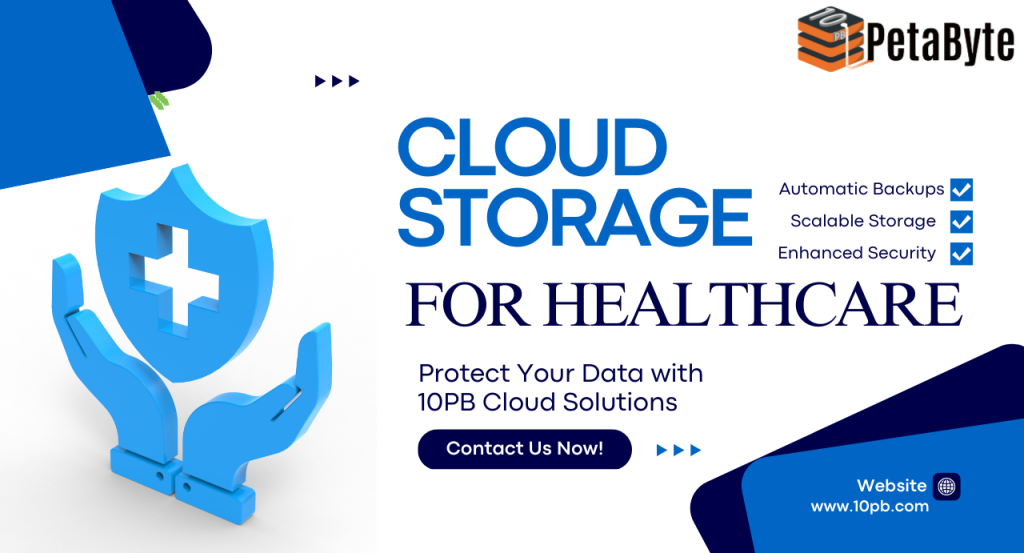In healthcare, cloud storage will be more crucial than ever by 2025. Secure and elastic cloud environments are more critical than ever because hospitals, clinics, and research centers create terabytes of data each day in the form of high-resolution imaging studies, EHRs, and real-time remote patient monitoring.
Data privacy laws such as HIPAA (Health Insurance Portability and Accountability Act) require healthcare data to be stored securely and made readily accessible to only authorized staff. Healthcare organizations, therefore, are seeking cloud providers who not only provide huge storage but also provide complete compliance and strong security.
We will discuss the Best cloud storage solutions for healthcare in 2025 in this blog, organized by performance, security, scalability, and compliance. The medical data management leader of the industry is the revolutionary 10PB cloud storage.
1. NFC Data Center’s 10PB Cloud Storage: The Top Choice for Modern Healthcare
Why it is significant:
In today’s data-driven healthcare landscape, cloud storage is not an option—it’s a necessity. NFC Data Centre sets the standard for 2025 with its healthcare cloud storage, offering unmatched capacity, performance, and industry-leading compliance.
Key Features:
- HIPAA-compliant architecture that includes encrypted data transfers and role-based access controls.
- Real-time backup and disaster recovery capabilities.
- improved data classification with AI to make it easier to retrieve imaging files and patient records.
- high data transfer rates to enable simultaneous access from several hospital locations.
- Global availability zones guarantee cross-continental access and redundancy.
- Hospitals can readily store anything from large MRI scan files to legacy patient information. It’s a perfect solution for health networks, government health departments, and research laboratories that demand high availability, speed, and compliance.
In case you are looking for cloud storage for healthcare that’s 2030-ready, NFC Data Centre’s 10PB is already there.
2. Google Cloud Healthcare API with Secure Cloud Storage
Google Cloud offers a powerful solution that is healthcare-oriented and includes FHIR, HL7v2, and DICOM protocols—ideal for interoperability between healthcare systems.
Advantages:
- AI and machine learning together in an attempt to perform predictive diagnostics.
- Anonymization and audit logging features.
- Seamless EHR integration with market-leading platforms.
- HIPAA and HITRUST certified infrastructure.
- Google’s cloud platform is suitable for healthcare startups and mid-scale hospitals who wish to utilize AI in patient care without undermining compliance.
3. Microsoft Azure for Healthcare: Best cloud storage solutions for healthcare
Azure cloud services have been a foundation for mission-critical workloads for a while. In 2025, Azure remains a good bet with healthcare-specific offerings, such as secure data lakes and analytics.
Benefits:
- In-built compliance with HIPAA, GDPR, and ISO standards.
- Hybrid cloud flexibility to link on-premises systems with cloud.
- Azure AI Health Bot integration for digital patient engagement.
- Sophisticated telehealth support with Teams integration.
Already Microsoft product implementation organizations in the healthcare sector experience Azure as an effortless and scalable upgrade to storage.
4. Amazon HealthLake with AWS S3 & Glacier
Amazon HealthLake converts health data into a queryable, structured format—ideal for analytics-based healthcare environments.
Features:
- Secure storage through AWS S3 and Glacier for both hot and cold healthcare data.
- In-built machine learning insights for population health management.
- Scalability from TBs to PBs without sacrificing performance.
- End-to-end encryption and HIPAA and HITECH compliance.
AWS’s broad tool set and global reach make it an adaptable choice for health providers of any size.
5.IBM Cloud for Healthcare
IBM has a deep history with healthcare enterprise, and its 2025 solution includes a secure, purpose-built platform for managing medical data.
Features:
- Support for multi-cloud and hybrid-cloud strategies.
- In-depth integration with Watson AI for health insights.
- Blockchain-secured data integrity for record keeping and clinical trials.
- HIPAA, GxP, and GDPR compliant.
IBM cloud offerings are well-suited for hospitals and research institutions carrying out R&D and clinical trials.
6. Oracle Cloud Infrastructure (OCI) for Healthcare
Famous for its high-performance computing capabilities, Oracle Cloud is causing a splash in healthcare with high-throughput, secure storage.
Advantages:
- Accelerated processing of large-scale EMR datasets.
- Integrated Oracle Autonomous Database for clinical data analysis.
- Strong compliance certifications such as HIPAA and PCI DSS.
- Built-in AI and machine learning capabilities in the infrastructure.
- Oracle tends to be the go-to for enterprise healthcare systems that need to bring data together from many different platforms.
Why Healthcare Needs Cloud Storage in 2025
- Data Growth: One hospital might generate as much as 50 TB of data each year. 100+ branches multiplied by that amount places you squarely in petabyte land.
- Cybersecurity Requirements: With healthcare as the #1 ransomware target, secure cloud solutions are necessary.
- Remote Access & Telemedicine: Doctors, nurses, and specialists require timely access to patient files across locations.
- Compliance Requirements: With laws evolving around the world, only cloud providers that are certified and meet HIPAA and similar requirements can meet statutory requirements.
Choosing the Appropriate Cloud Storage for Healthcare When selecting a provider, most weight should be given to:
- Scalability – Will it scale with your information?
- Security – Does it comply with or surpass HIPAA and other standards?
- Performance – How soon does your organization get access to records and imaging?
- Redundancy & Uptime – Is your data safeguarded from hardware failure or cyber attacks?
If your organization deals with high-resolution imaging, genomic data, or large clinical trials, consider upgrading to 10PB cloud storage. It provides future-proof storage that can adjust with emerging technology.
Final Thoughts
The appropriate Cloud Storage Solutions for Healthcare in medicine not only secures data—it enables clinicians to deliver more accurate diagnoses, improved patient results, and streamlined operations. With increasingly data-demanding technology on the horizon in 2025, from AI-powered diagnosis to live health monitoring, storage demands will keep growing.
NFC Data Centre 10PB cloud storage is the gold standard for unparalleled scalability, security, and compliance. With the national health network or private research hospital, healthcare data future in the cloud—and it’s starting with 10PB.
FAQs – Cloud Storage for Healthcare in 2025
- What is cloud storage for healthcare?
Cloud storage for healthcare refers to the secure storage of medical data—such as electronic health records (EHRs), medical images, lab results, and patient history—on remote servers accessed over the internet.
- Why is 10PB cloud storage important for healthcare providers in 2025?
10PB (petabytes) of cloud storage is increasingly essential due to the exponential growth of healthcare data.
- Is 10PB cloud storage HIPAA-compliant?
Yes, leading 10PB cloud storage providers like NFC Data Centre ensure full HIPAA compliance. This includes encryption, secure user access controls, audit trails, and disaster recovery mechanisms—all tailored to protect sensitive patient data.
- Who should use 10PB cloud storage in healthcare?
10PB cloud storage is ideal for:
- Large hospitals and health networks
- Government and public health agencies
- Medical research centers and labs
- Radiology centers handling large imaging volumes
- AI-focused healthcare tech firms
- Smaller organizations may also benefit as their data needs grow.
- How does cloud storage improve healthcare operations?
Cloud storage improves operations by enabling:
- Instant access to patient records across locations
- Seamless data sharing between departments and facilities
- Real-time backups and disaster recovery
- Scalability without on-site hardware costs
- Advanced analytics and AI applications


